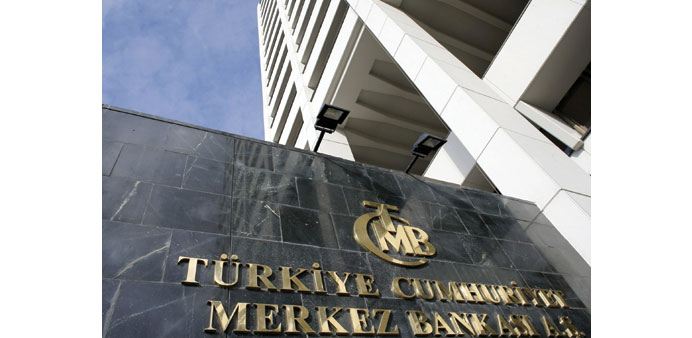Turkey’s central bank headquarters is seen in Ankara. If the central bank follows through on previous hints and raises rates in tandem with the US Federal Reserve, that would bolster investor confidence in both its independence and the new government’s economy czar, Mehmet Simsek.
Reuters
Istanbul
When Turkey’s central bank meets on December 22 to set policy for the last time this year, something far more important than interest rates will be at stake: the bank’s own credibility.
If the central bank follows through on previous hints and raises rates in tandem with the US Federal Reserve, that would bolster investor confidence in both its independence and the new government’s economy czar, Mehmet Simsek.
If, however, the bank holds fire, as it has done every month since March, it is likely only to worsen concern about political pressure on monetary policy and accelerate a sell-off that has seen foreign investors dump a net $6bn in local bonds this year, after at least three years of inflows.
“If there’s one thing that’s patently clear about Turkey’s central bank it’s that it will only hike rates when market conditions deteriorate dramatically - and even then it’s questionable whether it will act,” Nicholas Spiro of Spiro Sovereign Strategy told Reuters. “Turkey is the most reluctant tightener among the most vulnerable emerging markets - partly because of intense political opposition to rate hikes.”
Economists have argued that Turkey is long overdue for an interest rate rise to rein in inflation and put a floor under the lira. The bank’s refusal to do so has helped send the currency to series of record lows.
President Tayyip Erdogan equates high borrowing costs with treason. But Central Bank governor Erdem Basci has indicated that Turkey may raise rates once the Fed does.
The US Federal Reserve is widely expected to raise its benchmark rates for the first time in a decade at its policy meeting on December 15-16.
Holding fire after a Fed hike would also be seen as disastrous for Simsek, a former Wall Street banker who investors worry will not be able to stand up to Erdogan as much as his predecessor, Ali Babacan.
Simsek was forced to take to Twitter to defend the central bank’s independence almost immediately after his appointment, as concerns about government interference sent the lira sliding.
“In a country ruled by Erdogan, expecting a monetary policy consistent with the global environment and the reality of inflation is impossible,” said Atilla Yesilada, an economist with New-York based Global Source Partners. No matter what Fed does, the central bank will be forced to prioritise growth over fighting inflation, increasing downward risks on the lira, he said.
Some analysts say that Basci developed the unorthodox policy of using an interest-rate “corridor” of multiple rates partly as a way to take the heat off the central bank.
The central bank’s benchmark repo rate, is set at 7.5%. Some market participants refer to the repo rate derisively as the “politicians’ rate”, as it does not reflect the true cost of borrowing.
That is better reflected by the weighted average cost of central bank funding, which hovers at around 8.75%.
Markets expect that the benchmark repo rate could go as high as 9% in coming months.
Basci has said the bank would like to simplify the corridor once the Fed hikes rates. Simsek appeared to back him this week, saying that Turkey needed to improve predictability in monetary and fiscal policy.
“We should present a more orthodox monetary policy,” he said in a television interview.
Most recently, Erdogan repeated his call for lower interest at a Group of 20 summit last month in the Turkish resort of Antalya.
“In Turkey, the interest rates are high. Our rates are not those in the West, where they are low,” he said, as Basci and IMF chief Christine Lagarde looked on.
But economists say the inflation outlook hardly justifies lower interest rates. In October, the central bank raised its inflation forecast to 7.9% for this year, well above the 5% target.
Annual inflation hit 8.1% in November, suggesting it may even overshoot the revised forecast.
“If Fed hikes rates as expected, the central bank will also react by increasing the policy rate by 25 basis points,” said Finansbank’s Deputy General Manager Koksal Coban. “If the central bank does not move, it will have a negative impact on the markets. That’s a scenario that the bank won’t allow.”
Following the central bank’s decisions, investors will focus on whether the government will let pragmatism win out over populism, particularly whether it looks to pursue promised structural reforms.
“If the country gets these right, investors should have appetite for Turkey by Christmas,” Renaissance Capital said in a note to clients. “Otherwise Turkey’s goose might be cooked.”

